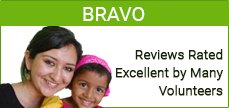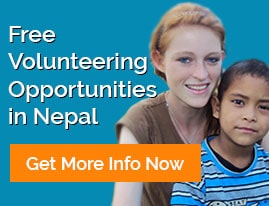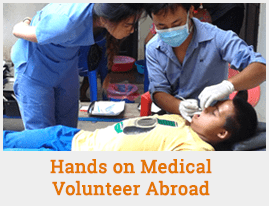VOLUNTEER IN GUATEMALA
' I LOVE this experience in chitwan for though short period! '
Xue Ying Fiona WangGuatemala FAQs
Disclaimer: The information given in this FAQ's page is generic. You should verify critical information such as visa-related issues, health and safety, customs and transportation with the relevant authorities prior to traveling. Please be aware that information given in FAQ's may change at any time. In effect, we accept no responsibility for any loss, injury or inconvenience sustained by anyone resulting from this information. For the latest updates, please contact us or our in-country coordinator(s).
General Information
The founder of RCDP has been involved in volunteer abroad business for the last 10 years.During this time, he has worked with more than 2000 volunteers and more than 200 universities, colleges, and schools groups.
Working with inspiring college students and humanitarian volunteers was very motivating as well as enjoyable and presented him many exciting learning opportunities. This experience encouraged him to start his own volunteer abroad program where affordable prices, premium programs and meaningful contributions to deprived communities would become the key components.
With this in mind, while setting up volunteer and travel abroad organization, we have selected many safe and culturally rich destinations where volunteers can make meaningful contributions, immerse in local culture, and get enriched from volunteer abroad experiences. In each destination, we have carefully selected projects, host families, travel coordinating staff, and placed local support staff. We have provided them with extensive training to manage the program with professional services that will be delivered with care and respect for all volunteers. We are now proud of our coordinators, host families, host projects, and staff as all of them have at least 4 years of working experience with international volunteers. To meet your expectation, we are committed to working hard. We have done our best to deliver professional services and turn your volunteer abroad experience into a memorable journey.
In Guatemala, we operate in Guatemala City and Quetzaltenango, also known as Xela. Guatemala City is the largest and most modern city of Guatemala whereas Xela stands as a beautiful historical site with abundant Maya ruins from pre-historic times.
Information on Application
Starting application
There are two options available to those applying for volunteer positions in Guatemala programs:
- Apply online (http://rcdpinternationalvolunteer.org/apply.php)
- Download the application form. Then, fill it out, and mail to RCDP.
After submitting application
Once RCDP receives your application, it will immediately be forwarded to Guatemala for processing. Our Guatemala in-Country coordinator will then carefully review your application to ensure you get placed in the project that matches your criteria and qualifications.
Duration of the application process
Once the Guatemala in-Country coordinator finalizes and forwards us the detail, we will immediately send it to you. The whole process normally takes 1-2 weeks. However, this can sometimes take longer time.
You will also find an invoice requesting you to pay the program fee along with the placement details.
Preparation
Once you receive the placement details, you can even call our Guatemala office directly and speak to our in-Country coordinator and any questions that might prepare you for the trip.
Preparation for Guatemala trip includes: reading about Guatemala, vaccination, visa arrangement, booking tickets. If you experience ANY problems, please call RCDP office.
Information on Airport and Arrival
Arrival Airport
Upon arrival in Guatemala City airport, volunteers will be met and picked up by a local RCDP representative who will then transfer volunteers to their assigned accommodations/volunteer projects.
Flight Delayed or Missed
If some sort of delay occurs, including flight delays or missed flights, contact our Guatemala office as soon as possible. Once you purchase air tickets, you should immediately forward the flight details to both RCDP and Guatemala office.
Arrival Day
Volunteers coming to Guatemala are advised to arrive one day before their program start. The program fee will cover expenses from the first day of the program to the last day of the program. If you arrive before the first day of the program and/or stay beyond the last day of the program, expenses will be the responsibility of the volunteer (usually $30 per day for room/food in hostel).
Information on Accommodation and Meal
In Guatemala, all volunteers stay with well-screened host families. Our host families are socially respected and are well versed in the art of hosting international volunteers. Host families offer a safe home, private rooms (occasionally rooms will be shared with other same-gender volunteers) and shared bathroom facilities with running water and a “western” style toilet. Volunteers can do laundry at the house or the host family may offer to do it for you for a nominal extra fee.
Host families provide typical meals that are traditional to Guatemala. You receive three prepared meals per day. If you will be out of the house during lunch hour, you can request a lunch "to go" that you can take with you or eat out on your own.
Information on Visa
RCDP International suggests all volunteers apply for a tourist visa before leaving for Guatemala. Though American, UK and Canadian citizens are able to acquire a visa at the airport, this can be time-consuming and is not guaranteed. Volunteers can acquire a Guatemalan visa from the Guatemalan Embassy or consulate in their home countries.
For stays exceeding 90 days, apply for an extension within the first week of arrival with the Guatemalan Immigration Department or exit the country for a minimum of 72 hours before re-entering on a new visa.
Information on Health and Safety
General Health Tips for Volunteers in Guatemala:
- Public water is not considered safe to drink in most of Guatemala. When traveling to the beaches or very rural areas, drink only bottled or boiled water or carbonated (bubbly) drinks in cans or sealed bottles. Tap water should not be considered safe at the beaches, nor are drinking fountains, fountain drinks (soda pop) and ice cubes. If purchasing pre-packaged water isn’t possible, make water safer by both filtering through an "absolute 1 micron or less" filter AND adding iodine tablets to the filtered water. Filters and tablets are found in camping/outdoor supply stores.
- Buy bottled water from respectable outlets/vendors to guard against an upset stomach. Make sure that the seal of the bottle is intact as it is not uncommon for local street merchants to sell tap water in resealed bottles.
1600 Clifton Road , NE
Atlanta , GA 31333
(888) 232-3228
(888) 232-3299 - fax information service - The most common health complaint in any developing nation is an ailing digestive system. In many cases, the illness may be attributed merely to a change in diet, but occasional cases of food poisoning can occur, whereby the symptoms occur very quickly, severely and explosively. These are seldom serious or extended illnesses, but medical treatment should be sought if it occurs.
- Avoid eating food from road side stalls/vendors. Don't eat unpeeled fruits or fruits that have already been cut by unknown handlers on the street. If you must eat food at a place that you have doubts about, make sure the food is served hot.
- If you require any prescription drugs, bring enough for the duration of your stay in Guatemala. They will need to be carried in their original prescription bottle and the prescription must be in your name.
- It is advisable that you carry a small health kit which should include remedy for upset stomach, some antiseptic cream, hydration powder, deer mosquito repellant, sun block, band aids, etc.
We recommend all traveling volunteers visit the Center for Disease Control's website (www.cdc.gov) for traveler's health recommendations. You should also consult with your personal doctor regarding current epidemics and medical concerns.
Information on Vaccinations
Recommended Vaccinations and Preventive Medications
The following vaccines may be recommended for your travel to Central America, including Guatemala. Discuss your travel plans and personal health with your healthcare provider to determine which vaccines you will need.
- Hepatitis A or immune globulin (IG). Transmission of hepatitis A virus can occur through direct person-to-person contact; through exposure to contaminated water, ice, or shellfish harvested in contaminated water; or from fruits, vegetables, or other foods that are eaten uncooked and that were contaminated during harvesting or subsequent handling.
- Hepatitis B, especially if you might be exposed to blood or body fluids (for example, health-care workers), have sexual contact with the local population, or be exposed through medical treatment. Hepatitis B vaccine is now recommended for all infants and for children ages 11-12 years who did not receive the series as infants.
- Malaria: if you are traveling to a malaria-risk area in this region, see your health care provider for a prescription anti-malarial drug. For details concerning risk and preventive medications, see Malaria Information for Travelers to South America and Mexico.
- Rabies
- Typhoid vaccine. Typhoid fever can be contracted through contaminated drinking water or food, or by eating food or drinking beverages that have been handled by a person who is infected. Large outbreaks are most often related to fecal contamination of water supplies or foods sold by street vendors
- Yellow fever, for travelers to endemic areas in Panama
- As needed, booster doses for tetanus-diphtheria,measles, and a one-time dose of polio vaccine for adults.
The best prevention of mosquito born diseases is wearing long-sleeves and pants (especially in the early evening) in addition to using insect repellants. This area of Guatemala has no malaria, but there are other mosquito-carried/transmitted diseases, such as dengue, that are just as bad and there is no vaccine, just prevention through clothing and repellent.
Information on Monetary Issues
Currency
Guatemala’s local currency is the “Guatemalan Quetzal” (GTQ)
Exchanging
Dollars can be changed at the exchange houses in the airport. Many businesses accept dollars at the current exchange rate.
ATM/Debit Card/Debit Card/Travelers Checks
ATM machines are available in various regions throughout Guatemala, especially Guatemala City and the airport where the option of US dollars or the Quetzal is often available. Do not arrive in Guatemala without any cash as ATM machines can be down or fail to accept your card. It is wise to check with your bank ahead of time to confirm that your card will work overseas. Debit cards and credit cards are becoming more acceptable at major stores; however, they are still not accepted as widely as in your home country.
Credit card fraud is an issue in Guatemala. Do not use your cards at any smaller or non-reputable locations. Information is often stolen and used fraudulently just by paying with a credit card. For this reason, RCDP International suggests cash and travelers checks to settle your bills. You will have trouble actually paying with traveler's checks, but you will be able to exchange them at local banks. Traveler's Checks are recommended as a safe way to carry money with you, make sure you write down the check numbers and contact information you need to cancel stolen checks. Different brands of traveler's checks work better in different countries so consult your local financial institution regarding which Traveler’s Checks to bring to Guatemala.
Budget
How much money you bring depends on your personal spending habits. Thrifty people can get by on less than $10/day. Your budget should also include money to explore Thailand in free time as well as for your personal use. A good rule of thumb for money management is the 1/3 method, bring 1/3 cash, 1/3 traveler's check and leave 1/3 of your money in your account - plus a credit card for emergencies.
Find the Exchange Rate for Guatemalan Quetzal (GTQ) athttp://www.xe.com/ucc/
Information on Field Support and Supervision
Once your volunteer program begins, our local staff members stay in constant touch with you. However, volunteers staying far from our office, our staff will visit you every 2-4 weeks (if possible) and volunteers are always welcome at the office. We recommend that volunteers stop by the office once a week, if they are staying/working in the local area, to give feedback on their home stay and project. Many minor issues can avoid escalation with a just little extra communication. Your project will have local staff members in addition to our in-country coordination staff. If your project is located a substantial distance from our offices, then our local staff communicates by either email and/or phone.
We are available for you at the local office via email and phone for your entire trip. It’s our job to make sure that you are safe and healthy.
Information on Communicating
There are a number of internet cafes located in some of the major cities such as Guatemala City, La Antigua and Quetzaltenango and usually cost about $1/hour. There are also international phone cards available to make international calls. Also, please use local phone cards for local calls as every minute of local or international use is billed to the families. If you need to contact the local RCDP staff members, your host family or project will generally allow you to use the phone for short periods of time.
Information on Weather
Guatemala has a lovely climate year round. The rainy season generally occurs from May to November. Fluctuations in weather are usually due to escalating altitudes, but warm temperatures are normally found throughout the country. Northern Guatemala features a hot, tropical climate with the majority of the rainfall occurring between May and September.
Both the coastal and northeast regions are hot and the drier period occurs from November to April, with average temperatures of 68°F (20°C). Guatemala City and La Antigua (designated as the “highlands”) both have a pleasant climate with less rainfall (as compared to the coastal regions), but experience colder temperatures in the evenings.
Information on Materials to Bring
- Camera
- Mobile phone (you can use your mobile phone after changing the sim card). NOTE: only bring cell phones that have multi-national coverage. You cannot switch to a new card here on the local phone system without being a resident and having a receipt for your phone on you.
- Sleeping bag
- Mosquito repellents
- Insect repellents
- Sun-block
- Work gloves (if joining conservation or construction project)
- Some books about Guatemala
- Map of Guatemala
- Toiletries
- First aid kit
- Flash light
- Electricity adapter/converter
- Sunglasses
- Shoes/boots (for work and travel)
- Towel
- Hot weather clothing but not overly-skimpy (conservative clothing)
- Jeans or pants or skirts
- Swimsuit
- Long-sleeve shirt and jacket for cooler areas (cool temperatures occur in the evenings in Guatemala City and Antigua )
- Raingear (especially during the rainy season which occurs from May to November)
Information on Bringing Gifts for Project
It is a common courtesy to bring a small gift for the staff that will be hosting you. You are not required to do so, but if you choose to bring something it can be pretty simple. We suggest a box of chocolates, a t-shirt with a hometown/country logo or pictures of your family and local post cards.
If you want to bring gifts for your project and if you are working for an orphanage or a school, please bring pencils, pens and paper, art supplies like markers and construction paper pads, as well as games for the children to enjoy. Remember that every child will need these items so you may wish to bring enough for a number of children.
 1-2543048951
1-2543048951


